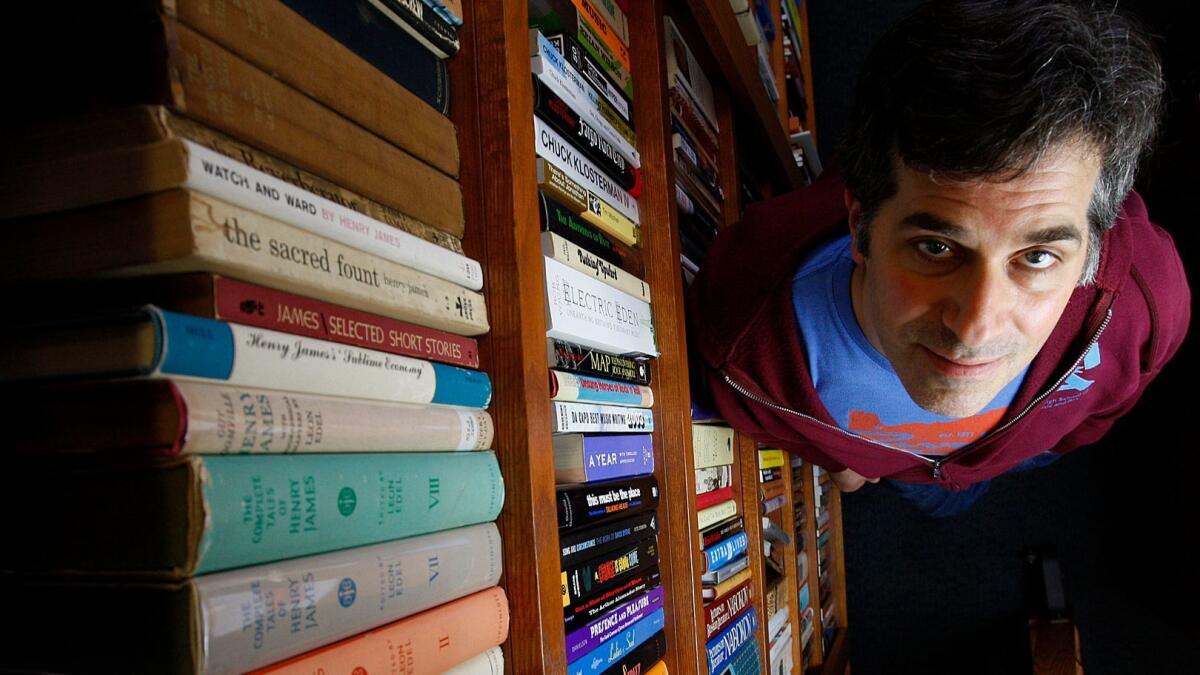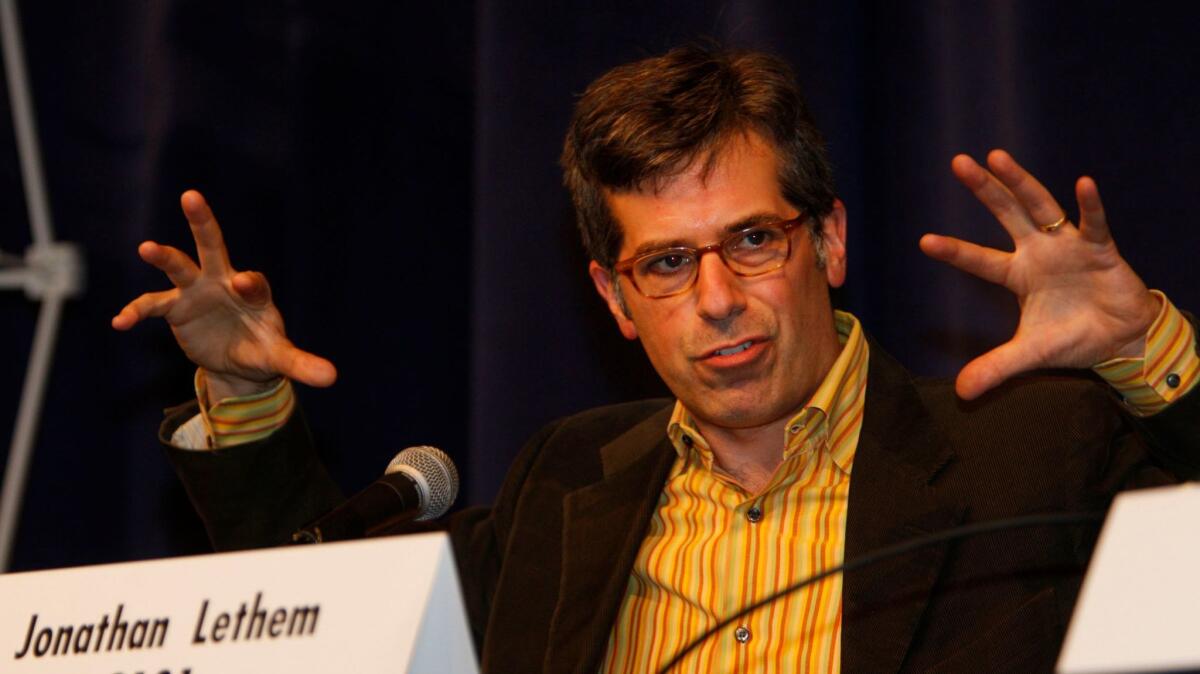Q&A: Jonathan Lethem on his new mega-literary, meta-literary collection

Writer Jonathan Lethem is best known as a novelist. His books “The Fortress of Solitude,” “Dissident Gardens” and “Chronic City” have wowed audiences and critics alike. But the focus on the novels, though warranted, allows too many to overlook his criticism. His first collection, "The Ecstasy of Influence," revealed that his nonfiction follows the trajectory of his fiction — that is, toward nuance, paradox and what he calls “apertures.”
Criticism, by its very nature, usually applies totalizing arguments, attempting to reduce, simplify or explain a work, a writer or a subject. The greatest critics, though, work against this natural impulse. It's in his moments of pause, his conflicts of thought and his movements toward ambiguity, that we see a fine critical mind at work.
Lethem's second collection of criticism, “More Alive and Less Lonely,” highlights selections from two decades of his writing on books and authors, showing off not just his commitment to the noncommittal but also his appreciation for and understanding of the pure pleasure of reading. As he explains in one of the selections, “I followed the higher principle of pleasure, tried to end where I’d started: with writing I loved and wanted to recommend to someone else. That is to say, you.”
Writer Christopher Boucher made the selections for this book, but I'm curious if you gave him any specific guidance.
It started with me just throwing him into the deep end. In making my previous collection, “The Ecstasy of Influence,” I had done the archival work of finding and creating an electronic copy of every last weird piece I’d ever written. For that book, I threw myself into the deep end. So I had everything that didn’t go into “The Ecstasy of Influence,” and it was a lot of stuff that I passed on to Chris. Of course, I had some leanings; I had essays I thought might be some of the key pieces that had been excluded from the earlier collection. But I had no structure at all, so you never know once you get that structure in place how something marginal might turn out to be important, or the opposite situation.
See Jonathan Lethem at the L.A. Times Festival of Books on Sunday at 1:30 p.m. »
Were you surprised by his choices?
As I reread certain things, of course, some of my own illusions and presuppositions fell away. There were things that I remembered liking that in rereading I realized, “Oh, that stinks!” But there were also instances of the opposite. Some things that he latched onto, I then had to figure out: “Why does he like that?” or “What is this doing?” That included some nice surprises. He foregrounded the piece about Eric Berne’s children’s book, “The Happy Valley,” putting it at the front of the collection. I never would have imagined doing that. I had mixed feelings about how that piece came out, at least partially because the original editorial process hadn’t been that groovy for me. He liked it, though, and he wanted not only to include it, but to plant it like a flag in the beginning for the whole book to follow. I was really surprised, but it was his book, and I saw what he was doing. He came up with the section titles and the book title, or rather he located the titles by finding phrases inside my essays. I would have never thought to title a book “More Alive and Less Lonely,” even though those are my words.

I imagine this might be your first book to have a title you didn’t choose.
Well, I’ve retitled a bunch of my books under pressure. The titles have always been mine, but sometimes they’re my second or third go at it. I’ve always had working titles that I was infatuated with. A majority of my titles have been brushed aside by the publishers. All my novels, except for two, have a kind of phantom title that I’m still very attracted to. This reached its apotheosis with “A Gambler’s Anatomy,” which had the same kind of story, except the English publisher liked my original title better, so it’s called “The Blot” in England and “A Gambler’s Anatomy” in the U.S. But you’re right that this is different in that this is his title.
Does it feel very “you” to you?
I wrote those words, but I would never have isolated them or leaned toward them. Yet I like the title very much, in that it’s his. Therefore, it catches the spirit of the project, which is my words and his book.
Your writing does seem to argue implicitly that very idea: that books, and the arts in general, allow us to feel more alive and less lonely. Is that fair to say?
It seems right. The book is itself an enacting of that. It’s intertextual, in a way, or multi-authorial, so it goes with my whole thesis in “The Ecstasy of Influence.” Books are not monolithic objects. They’re fungible, and humans move in and out them, and back and forth, with texts penetrating each other. In fact, books are more alive because they’re less lonely.
Books are not monolithic objects. They’re fungible, and humans move in and out them, and back and forth, with texts penetrating each other.
— Jonathan Lethem
You added a few “footnotes” to the book. The footnote on Ishiguro opens, “Some of these pieces embarrass me.” It’s nice that you decided to keep in some of that “embarrassing” work. We live in a time where embarrassment and shame aren’t really appreciated. They’re seen as the enemy of this whole self-esteem thing. Do you think shame and embarrassment have value for a writer? And if so, what is their value?
I feel really committed to them, and I’m so glad for the question. I first really felt that embarrassment was one of my preoccupations when I wrote “The Fortress of Solitude.” That book was about giving a name to something that was boundlessly uncomfortable for me, which was what had gone on between me and the kids who were not exactly bullying me, and not exactly mugging me, and not exactly giving me a lesson in racial dynamics, but were just doing this thing that had a local name: We called it yoking. The whole book took its subject from this embarrassment.
You’re right in that we live in a time where everyone’s got to clean up their house, protect their perimeter, “get woke,” sponge the mistakes or missteps, because we’re also in a time of extraordinary accusation, patrolling and self-patrolling. So just getting in the mix with your own blunders and uncertainties can feel so much more dangerous.
One of the highlights of your writing is your grasp of the importance of a last line. My favorite in this collection, for example, is: “The only breast I fondled in East Hampton was Roth’s.” What is the importance, to you, of a last line?
The irony is that ending novels is the hardest writerly work I put myself in for, and I don’t imagine I’m alone in feeling that. The difficulty of a critical piece, though, is different; it’s finding the line to step in on. The line that gets you out is like the mic drop. You get to hit send and be expunged of the deadline that you’ve been cursing your way through. What’s great about them is that they usually crop up, and it’s just about spotting them when they come. It’s basically just seeing the exit door and making a dash for it.
Building off that, in your fiction and nonfiction, you always seem to strive for nuance and negative capability. Even your most direct arguments never feel cheapened by didacticism. Is it important to you — even, and perhaps especially, in a time such as this — that we maintain ambiguity in art and criticism?
I hope that is the character of my argumentation, that I try to foreground a lot of qualifications or subjectivity or error — the sensation of thinking, and hesitating in thinking. The method of discovering what you think involves not just the great sword-thrust of achieving it and saying “touché,” but stopping and waiting and doubling back. That’s what it’s like to care about things, and think about things, to be stuck a lot.
Ironically, maybe I’m didactic on this point. I connect it with this remark John Cassavetes made about being handed scripts that he didn’t like, but that he’d taken money to perform in. He realized, as an actor, that he could still say something if he inserted what he called “stops” in them — moments where the character’s thinking could be considered. Instead of saying the banal or emphatic thing that was in the script, you could somehow register that the person didn’t completely mean it, or believe it, or was arriving at it, or understood it was a mask or a performance. I am less interested in seizing the power of unmitigated rhetoric. That’s what a lot of language does — it tries to persuade you or enrapture you or destroy some other viewpoint. I just always thought, “Oh, let’s look at how rhetoric is riddled with uncertainties, instabilities and reservations about itself. Maybe that’s my way of persuading.” That sounds, perhaps, like it reduces it to just another rhetorical trick, but it’s one that is at least committed to the noncommittal.
It’s at least a self-critiquing rhetoric.
Yes, it has apertures or stops in it. The script notices itself.
The book’s introduction mentions your “spirit of restless inquiry,” and in one of the pieces on Philip K. Dick, you write, “The questions remained. It is the absurd beauty of their asking that lasts.” Do you see the critic’s job more as asking the right questions than producing the correct answers?
Yeah, it’s sort of like art itself. If it’s any good, it’s because it opens up territory and amplifies possibilities. A totalizing resolution is what’s so treacherous in much of criticism. It threatens to reduce fields of operation whose energies are characterized by their multifariousness, their expansiveness, their paradox — what you called “negative capability” earlier. So, yes, I’d rather ask a good question, of course. That’s become a kind of rote sentiment in itself, but I believe in it.
Malone is the founding editor of the literary magazine the Scofield.
Sign up for our Book Club newsletter
Get the latest news, events and more from the Los Angeles Times Book Club, and help us get L.A. reading and talking.
You may occasionally receive promotional content from the Los Angeles Times.



